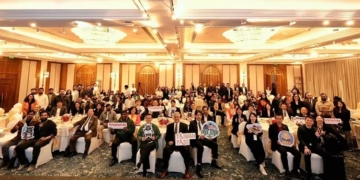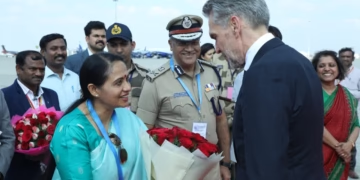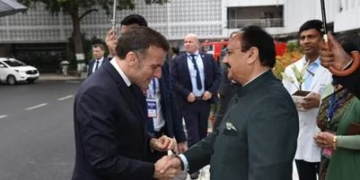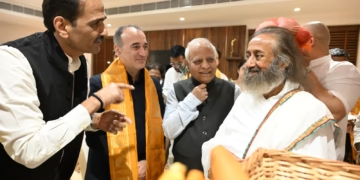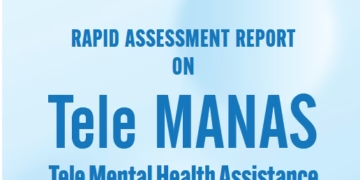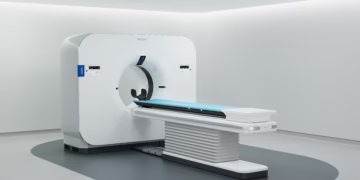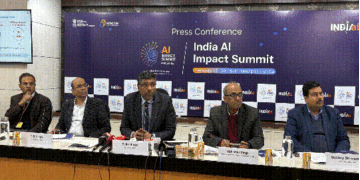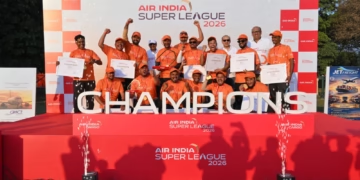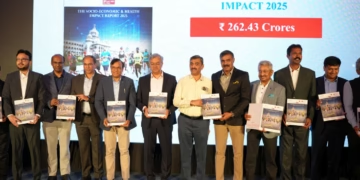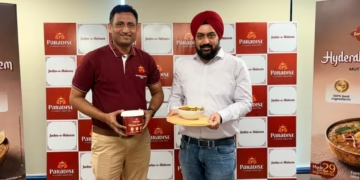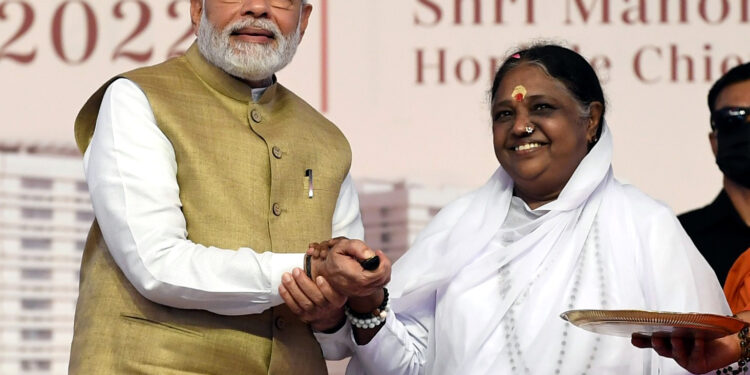“Amma is the embodiment of love, compassion, service and sacrifice. She is the carrier of India’s spiritual tradition”
“India is a nation where, treatment is a service, wellness is a charity. Where health and spirituality are related to each other”
“Education and Medicine by our religious and social institutions is called Public-Private Partnership but I also see it as ‘Paraspar Prayas’”
“India did not face the kind of vaccine hesitancy as seen in other countries also because of the message from spiritual leaders”
“When we give up this mindset of slavery, the direction of our actions also changes” “True development is the one that reaches everyone”
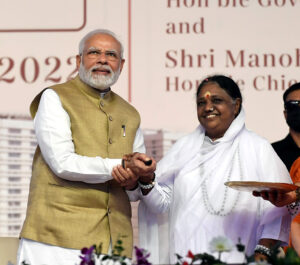
The Prime Minister, Narendra Modi inaugurated state-of-the-art Amrita Hospital at Faridabad today. Governor of Haryana Bandaru Dattatreya, Chief Minister Manohar Lal, Deputy Chief Minister Dushyant Chautala, Union Minister Krishan Pal Gurjar, Sri Mata Amritanandamayi were among those present on the occasion.
Speaking on the occasion, the Prime Minister said that as the country is entering the Amrit Kaal and collective aspirations and resolutions are taking shape, it is fitting that the country is getting the nectar of blessings of Sri Mata Amritanandamayi. He said that this hospital is a blend of modernity and spirituality and will become a medium of accessible and affordable treatment for needy patients. “Amma is the embodiment of love, compassion, service and sacrifice. She is the carrier of India’s spiritual tradition”, he said.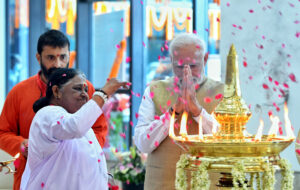
Dwelling on the great tradition of service and medicine of India, the Prime Minister said, “India is a nation where treatment is a service, wellness is a charity. Where health and spirituality, both are related to each other. We have medical science as a Veda. We have also given the name of Ayurveda to our medical science.” He reminded the gathering that India never allowed its spiritual and service legacy to go into oblivion even during the difficult period of slavery for centuries.
He noted the good fortune of the nation that spiritual energy in the form of saints like poojya Amma always pervaded all the corners of the country. The Prime Minister further added that this system of discharging the responsibilities related to education and medicine by our religious and social institutions is in a way the PPP model of old times. “It is called Public-Private Partnership but I also see it as ‘Paraspar Prayas’ (mutual effort)”, the PM said.
The Prime Minister remarked on the Made in India vaccine, and the kind of propaganda that was unleashed by some people. As a result, many kinds of rumors started spreading in the society. The PM further added that when the religious leaders and the spiritual teachers of the society came together and asked the people not to pay heed to the rumours, the effect was immediate. India did not face the kind of vaccine hesitancy as seen in other countries.
Recalling his address to the nation from the ramparts of the Red Fort, the Prime Minister said that he has placed a vision of the five vows of Amrit Kaal in front of the country and one of these five vows (Pran) is the complete renunciation of the mentality of slavery. He remarked that it is also being discussed a lot in the country at this time. The Prime Minister said, “When we give up this mindset, the direction of our actions also changes.” This change, he continued, is visible in the healthcare system of the country as there is growing faith in the traditional knowledge of the country. Yoga has global acceptance today and the world will celebrate International Millet Year next year.
While concluding the address, the Prime Minister said that today, Haryana is one of the leading states in the country where every house has been connected with a piped water facility. The Prime Minister congratulated the people of Haryana for their excellent contributions to the Beti Bachao, Beti Padhao campaign. He further added that subjects like fitness and sports are in the culture of Haryana.
With this vision, Amrita Hospital, Faridabad will open as one of India’s largest private hospitals. The Hon’ble Prime Minister of India, Shri Narendra Modi, will inaugurate the hospital on August 24th. Welcoming patients from across the globe, it will have 81 specialities, 64 fully-networked modular operation theatres, and smart ICUs with 534 critical care beds.
“May this new hospital become an abode of service to humankind and a place of solace for the sick. May this institution be both a hospital and a temple, where external and internal healing are provided,” said Amma.
The hospital has eight Centres of Excellence, including radiation oncology, cardiac sciences, neurosciences, gastro-sciences, bone diseases and trauma, transplants, renal sciences, and mother-child care. It will also have one of India’s largest pediatric super-speciality centres, one of the most advanced medical imaging services, and one of the largest facilities to handle infectious diseases.
Research is another focus area to find low-cost solutions for healthcare needs and includes a centre for state-of-the-art robotics, haptic, and surgical-medical simulation. The hospital will also operate a medical college and one of the country’s largest allied health sciences campus.
“This will be truly a world-class institution, the like of which the country has not seen before, both in terms of magnitude of scale as well as medical excellence,” said Dr Sanjeev K Singh, Resident Medical Director, Amrita Hospital, Faridabad.
The institution began with Amrita Hospital in Kochi, Kerala, which has been a bulwark of the healthcare system in South India for 25 years. The facility was inaugurated by then Prime Minister of India, Shri Atal Bihari Vajpayee, on May 17, 1998. What started as a 125-bed facility has become a 1,350-bed institution that treats 800,000 outpatients and 50,000 inpatients each year.
“India is the second most populous country and this makes India’s health problems the world’s problems. The numbers are truly staggering, with more than 60 percent of the world’s diabetics and half the world’s blindness. These large numbers of people in both rural and urban areas require affordable health care that is of high quality for their survival,” said Dr Prem Nair, Group Medical Director, Amrita Hospitals.



